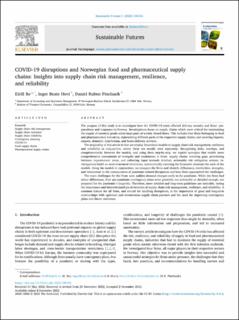COVID-19 disruptions and Norwegian food and pharmaceutical supply chains: Insights into supply chain risk management, resilience, and reliability
Peer reviewed, Journal article
Published version

Åpne
Permanent lenke
https://hdl.handle.net/11250/3042294Utgivelsesdato
2022Metadata
Vis full innførselSamlinger
- Scientific articles [2181]
Sammendrag
The purpose of this study is to investigate how the COVID-19 crisis affected delivery security and firms’ preparedness and responses in Norway. Investigations focus on supply chains which were critical for maintaining the supply of essential goods when large parts of society closed down. This includes four firms belonging to food and pharmaceutical industries, representing different parts of the respective supply chains, and covering imports, exports, domestic distribution, and home-delivery services. The originality of this article is that we employ theoretical models on supply chain risk management, resilience and reliability in conjunction, where these are usually used separately. Recognizing links, overlaps, and complementarity between the models, and using them step-by-step, we exploit synergies that enable more comprehensive assessments of strengths and weaknesses in firms’ supply chains, covering gaps, prioritizing between improvement areas, and collecting input towards detailed, actionable risk mitigation actions. Investigations build on semi-structured interviews, systematically covering the formative elements for each of the models. Using the models in conjunction, we compare the firms and identify differences, similarities, strengths, and weaknesses in the consequences of pandemic-related disruptions and how firms approached the challenges. The main challenges for the firms were sudden demand changes early in the pandemic. While the firms had minor differences, their pre-pandemic contingency plans were generally not actionable or detailed enough, nor prepared for the pandemic's longevity. Therefore, more detailed and long-term guidelines are desirable, noting the importance and interrelationships of elements of supply chain risk management, resilience, and reliability. A common feature for all firms, and crucial for handling disruptions, is the importance of good and long-term relationships with upstream and downstream supply chain partners and the need for improving contingency plans and future resilience. COVID-19 disruptions and Norwegian food and pharmaceutical supply chains: Insights into supply chain risk management, resilience, and reliability
Utgiver
ElsevierTidsskrift
Sustainable FuturesBeslektede innførsler
Viser innførsler beslektet ved tittel, forfatter og emneord.
-
The importance of resource interaction in strategies for managing supply chain disruptions
Bygballe, Lena Elisabeth; Dubois, Anna; Jahre, Marianne (Peer reviewed; Journal article, 2022)The turbulent business environment highlights the need for strategies for mitigating, responding to, and recovering from (that is, managing) supply chain disruptions. Resources are central in these strategies but remain ... -
Supply chain management - Wastage within the fresh produce supply chain: A case study of mangoes in Ethiopia.
Wadhawan, Sahil; Kinserdal, Simen Cesar (Master thesis, 2020)In recent years, there has been an increasing focus around the term sustainability and its practical implications. One major component in this development is the “accelerated productivity in food chains”. The relevance ... -
Improving humanitarian response through an innovative pre-positioning concept : an investigation of how commercial vessels can be used to store and transport relief items
Wilberg, Kristin Heien; Olafsen, Amund Leinaas (Master thesis, 2013-02-19)Both the number of natural disasters and the people affected by these disasters have increased substantially during the recent decades. Not only is the frequency higher, but the complexity, severity and magnitude of natural ...
